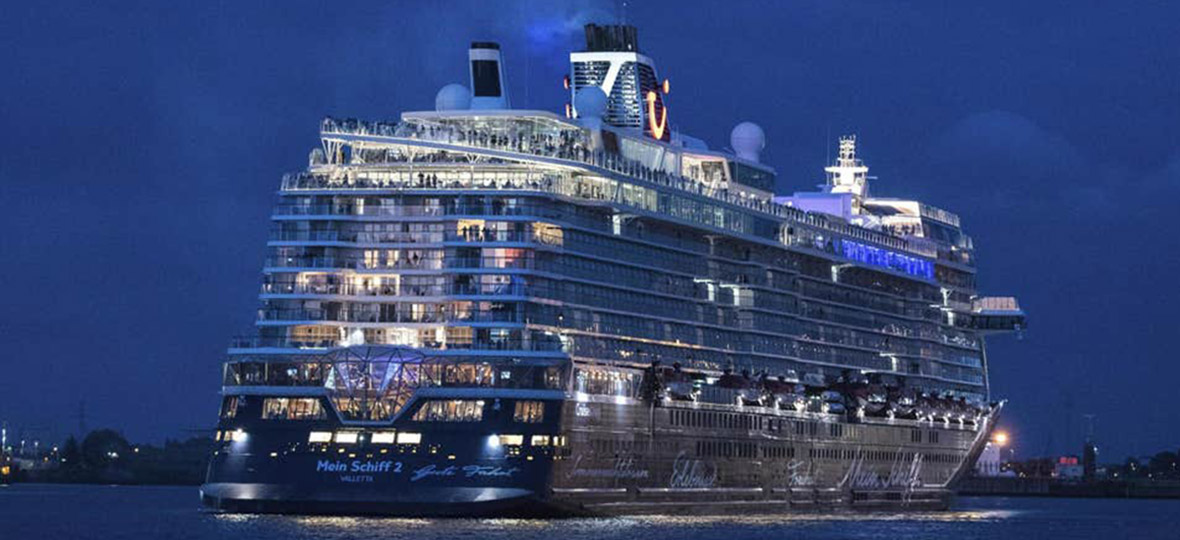A German cruise ship has set sail with strict precautions to keep passengers and crew as safe as possible. It’s the first time since the industry was shut down by the coronavirus pandemic. Spain’s summer destinations may be locked down again after a spike, and the number of confirmed coronavirus cases worldwide has topped 16 million.
By the numbers
According to a tally by Johns Hopkins University, the US leads the COVID-19 count with 4.1 million cases, followed by 2.3 million in Brazil and 1.3 million in India. Canada has 115,470 cases.
The US also has the highest number of deaths with 146,460, followed by 86,449 in Brazil and 45,823 in the UK. Canada has 8,890 deaths.
Just for comparison, Canada has approximately 10% of the population of the US – 37.59 million compared to 331 million. The state of California has a more comparable population of 39.51. However, California has over 459 thousand COVID cases and 8,429 deaths.
Setting sail

For the first time since the industry was shut down months ago, a cruise ship has sailed. The TUI ship ‘Mein Schiff 2’ (My Ship) sailed from Hamburg with 1,200 passengers on board compared to its normal 2,900 capacity, late on Friday night, the dpa news agency said. It was not reported how many crew were also on board.
Passengers will spend the weekend at sea with no land stops before returning to Germany on Monday.
The ship is using strict precautions to keep passengers and crew as safe as possible. Occupancy was limited to 60% so passengers could keep their distance from one another, although that level was not reached. On board, passengers and crew are required to stay 1.5 metres (5ft) away from one another or wear protective masks and they will not be able to serve themselves at the ship’s buffet.
All passengers also had to fill out a health questionnaire before boarding and had their temperatures taken. German cruise companies are hoping that shorter, strictly controlled trips will help restart the business that has been devastated by the pandemic.
On August 5, the AIDA will sail from Hamburg, a second will leave on August 12 from Rostock and a third departing on August 16 from Kiel.
Germany is now in the process of reopening its economy, with strict guidelines on social distancing, mask use and personal hygiene measures, has reported over 206,000 infections but kept deaths to 9,124.
Early closing
A popular resort town in Austria has ordered restaurants and clubs to close early and urged people to avoid going out as it grapples with a new outbreak of the coronavirus. Hundreds of people have already been tested in the town of St. Wolfgang, east of Salzburg, after the outbreak was first detected Friday. At least 44 of those have tested positive, at least 26 whom are interns working in tourism.
They’re thought to have become infected while partying in the town’s bars, two of which have now been temporarily closed to prevent further spread. All have been ordered to close no later than 11 p.m. until further notice.
Austria had relaxed many coronavirus restrictions in recent weeks, but has seen a rise in the number of infections lately. Chancellor Sebastian Kurz last week announced that the country was reintroducing mandatory face masks again in supermarkets, smaller grocery stores, post offices and banks.
Pain in Spain
Nightclubs, bars and beaches – some of Spain’s most beloved summer venues – are facing new lockdown restrictions after turning into coronavirus hot spots.
The northeast region of Catalonia now hosts two hotspots in Spain, prompting authorities to tighten restrictions in Barcelona and a rural area around Lleida that were relaxed only a month ago when Spain had its devastating outbreak in check.
Britain has put Spain back on its unsafe list and announced Saturday that travellers arriving in the UK from Spain must now quarantine for 14 days. Norway also ordered a 10-day quarantine for those returning from the Iberian Peninsula. France and Belgium are recommending that travellers ditch plans to spend their summer vacations in Barcelona and its nearby beaches, which have seen crowds too massive to allow for social distancing. Police have had to step in and take measures to reduce the number of beach-goers.
Spain reported over 900 new daily infections on Thursday and Friday as authorities warned that the country which lost at least 28,400 lives before getting its outbreak under control could be facing the start of a second major onslaught.
National health authorities warned that Spain already could be heading for a “second wave” of the virus that experts had forecast would come during the colder months.
Catalonia ordered all nightlife venues to close for 15 days and applied a midnight curfew on bars in and around Barcelona and Lleida late Friday, hours after French Prime Minister Jean Castex urged French citizens not to visit Catalonia due to the upticks in new infections.
France is also struggling to stop a spike in new cases but it apparently sees a risk in importing new infections from Spain as well.
Tourism employs 2.6 million people in Spain and generates 12% of the country’s economic activity. Spain’s government, unions and industry leaders are heavily invested in promoting the message that Spain is a safe destination for foreigners to salvage the tourism season.
That now looks more and more like wishful thinking, meaning the economic blow heading Spain’s way will likely be greater than the deep recession already forecast.
“We have seen a wave of cancellations above all by foreign clients from France, Germany and England who were supposed to come next week, above all to Barcelona,” said David Riba, president of the Federatur tourist apartments group.
Young adults in many of Spain’s cities have been completely flouting the health rules and guidelines.
Recent outbreaks have been linked to a discotheque in the southern city of Cordoba and to bars in Murcia, in the southeast.
In Pamplona, authorities have tested 1,000 residents aged 17 to 28 after monitoring an outbreak associated with young people socializing in a neighbourhood that has since been put under medical surveillance. Officials in Madrid are considering similar restrictions.
Young people are not the only ones unhappy with the moves. Two business associations for nightclubs and bars say they will take the Catalan government to court to block a decision they say puts 35,000 jobs at risk.
Challenges in Africa
South Africa has announced more than 12,000 new confirmed coronavirus cases as the total in one of the world’s worst affected countries reaches 434,200 with 6,655 deaths.
South Africa makes up well over half the confirmed cases on the African continent, where experts say the virus could linger in areas poorly served by health services.
Africa now has more than 828,000 cases. The true number of cases on the continent of 1.3 billion people is unknown because of testing shortages and insufficient data. The World Health Organization has said more than 10,000 health workers in Africa have been infected, many of them nurses, further challenging efforts to contain the virus spread.

